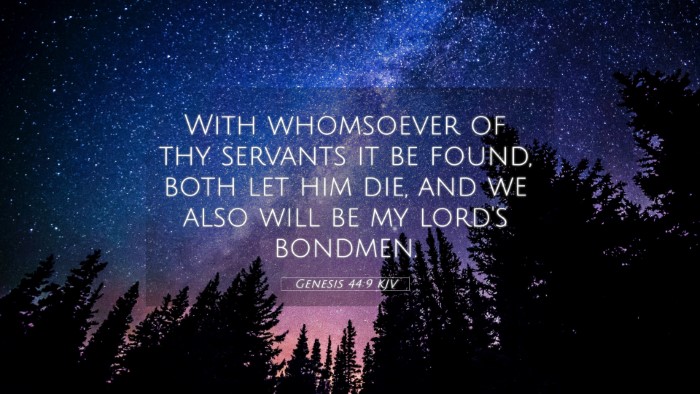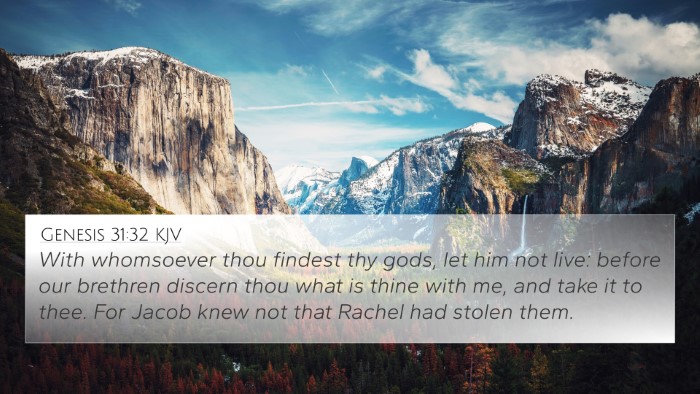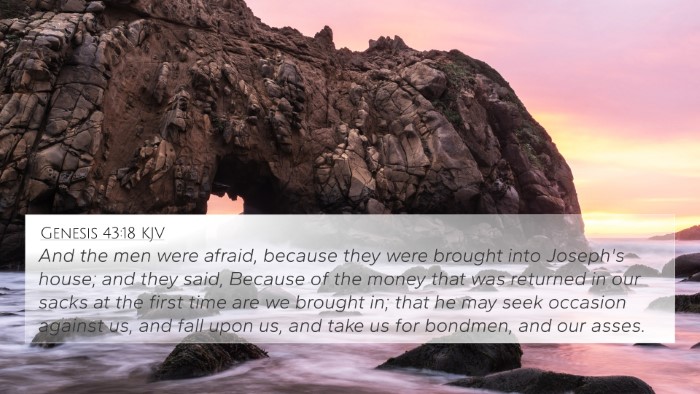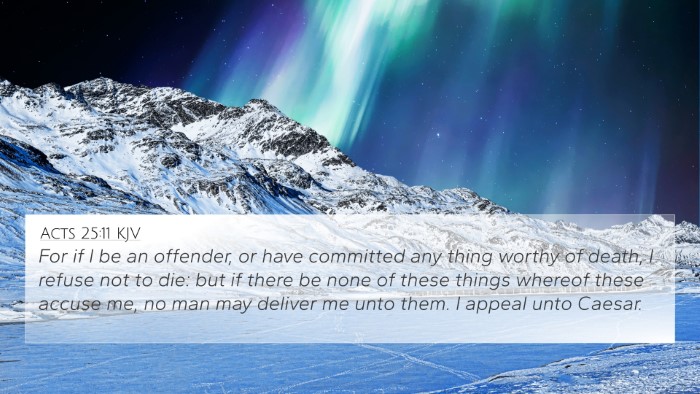Understanding Genesis 44:9
Genesis 44:9 states: “With whomsoever of thy servants it be found, both let him die, and we also will be my lord's bondsmen.” This verse occurs in the context of Joseph's test for his brothers when he accused them of theft. Here, they boldly claim a harsh ultimatum, underscoring their willingness to accept severe punishment should they be deceived.
Context and Overview
The narrative of Genesis 44 unfolds as Joseph's brothers return to Egypt during a time of famine. Joseph, still unrecognized by his brothers, tests their integrity and character regarding their treatment of their younger brother Benjamin. This verse reflects a moment of tension and reveals the brothers' fear of divine retribution for their past wrongs.
Exegetical Insights
This verse has been analyzed extensively by public domain commentators:
- Matthew Henry: Henry emphasizes the themes of justice and the weight of responsibility. He notes that the brothers, while seeking to prove their innocence, ironically affirm their guilt through an oath filled with harsh consequences. This indicates their awareness of past misdeeds e.g., their betrayal of Joseph.
- Albert Barnes: Barnes discusses the significance of the phrase "let him die," underscoring the extreme reaction the brothers express in the face of potential false accusation. His commentary suggests the deeper moral and familial dynamics at play, hinting at their growth compared to their earlier attitudes.
- Adam Clarke: Clarke explores the rhetorical intensity of the brothers' vow and suggests that it reflects their sincere desire to protect Benjamin. He posits that this moment marks a crucial turning point in their character development, as they move from self-preservation to collective responsibility.
Connections to Other Scriptures
Genesis 44:9 resonates with several other verses throughout the Bible, showcasing thematic continuity and inter-Biblical dialogue. Here are some related references:
- Genesis 37:28 – The betrayal of Joseph for silver, establishing the backdrop of guilt.
- Genesis 42:21 – The brothers’ acknowledgment of their sin against Joseph, indicating their growing self-awareness.
- Deuteronomy 24:7 – The law regarding kidnapping and the value of individual lives, connecting with the idea of justice.
- Exodus 22:1 – Discusses restitution in cases of theft, returning to themes of accountability and penalty.
- Psalms 1:6 – The notion of the righteous and wicked, illustrating moral outcomes related to choices.
- Acts 7:9-10 – Stephen recounts the history of Joseph, reiterating themes of jealousy and reconciliation.
- James 1:15 – Conveys the idea that sin leads to death, reflecting the seriousness of their vow.
Thematic Analysis
Through comparative Bible verse analysis, we find Genesis 44:9 serves as a reflection on themes of:
- Guilt and Redemption: The brothers’ declaration reveals their struggle with past transgressions and their yearning for redemption.
- Consequences of Actions: Their steadfastness in the face of perceived injustice illustrates the weight of one's choices and their potential consequences.
- Divine Providence: The unfolding drama mirrors God's sovereignty, showing that past sins can lead to situations designed for ultimate reflection and change.
- Family Dynamics: The brothers' willingness to protect Benjamin indicates a shift towards unity and moral accountability.
Conclusion
The examination of Genesis 44:9 reveals profound insights into human nature, accountability, and the complexity of familial relationships. The interplay of themes like guilt and redemption invites readers into a deeper discourse regarding the implications of our choices in the light of divine oversight.
SEO Relevance
This exploration serves as an excellent resource for those interested in Bible cross-reference guide tools. Understanding cross-references and exploring links between scriptures not only enriches personal study but also aids in sermon preparation and thematic explorations within Scripture.
In seeking connections between Bible verses, one can utilize Bible reference resources and concordances to discover the intricate web of scriptural cross-referencing, enhancing both individual and communal understanding of biblical texts.








